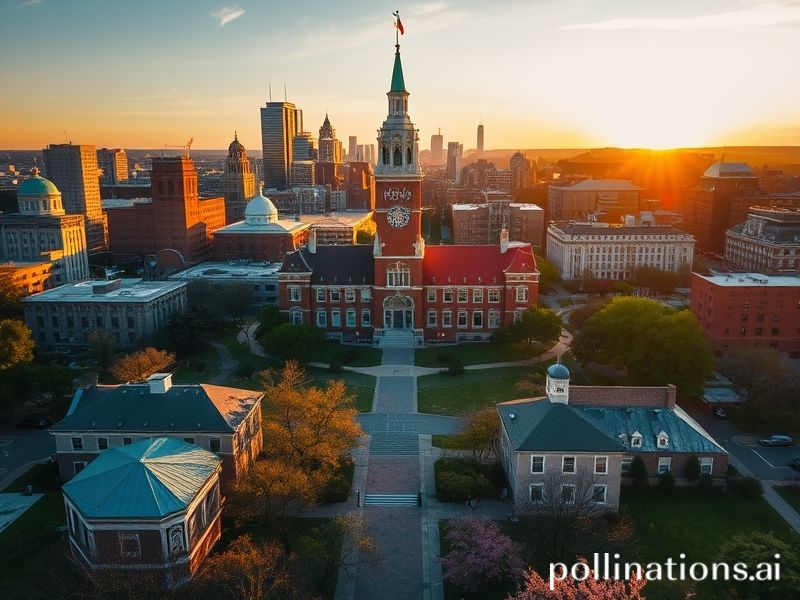Temple University: The Philadelphia Campus Where Global Ambition Meets American Collapse
Temple University: A Rust Belt Campus Where the World Comes to Watch America Argue With Itself
By Dave’s International Affairs Desk, with a reporter who’s slept in every major airport from Changi to Schiphol and still prefers 30th Street Station’s broken coffee machines.
If you stand on the North Philadelphia corner of Broad and Montgomery long enough, every geopolitical tension on the planet will eventually shuffle past wearing AirPods and a Temple University hoodie. The sweatshirt itself—made in Bangladesh, screen-printed in Delaware, sold at the campus Barnes & Noble—functions as a wearable passport: it announces to the world that its owner has chosen to pay American tuition prices for the privilege of witnessing late-stage capitalism in real time, with extra credit.
Founded in 1884 by a Baptist minister who apparently believed that educating the urban poor was a neat hobby between sermons, Temple has spent 140 years perfecting the art of being simultaneously local and global. It is a Philadelphia commuter school that somehow issues more foreign student visas than some European embassies. Its physician assistants treat uninsured neighbors in the morning and uninsured study-abroad students in the afternoon—one stop shopping for the collapse of the American welfare state, wrapped in a cherry-and-white marketing campaign.
In lecture halls purchased with endowments that could have rebuilt Haiti three times over, you will hear Mandarin whispered next to Spanish, next to Yoruba, next to the unmistakable Philadelphia dialect that sounds like English but with extra consonants and emotional damage. The economics department alone hosts representatives from 42 countries, all taking notes on how the richest nation on earth manages to ration insulin like it’s 1940s London and butter is scarce. International relations majors write dissertations titled “Soft Power and Septa Delays: How Late Trains Undermine Hegemony,” while the Fox School of Business quietly teaches the same financial engineering that brought you the 2008 meltdown, now with blockchain sprinkles.
Of course, Temple’s most famous export isn’t knowledge—it’s debt. Foreign students arrive bright-eyed, clutching acceptance letters that read like golden tickets until they discover the fine print converts to Swiss francs, Saudi riyals, or Brazilian reais at rates that would make the IMF blush. Meanwhile, the university’s endowment managers diversify into Singapore REITs and Ghanaian fintech, hedging against the dollar’s slow-motion swan dive like any prudent multinational. Call it imperialism in reverse: instead of sending gunboats, we send promissory notes.
The campus architecture tells the same story in concrete and steel. A Brutalist library—designed by the same firm that gave East Berlin its flair—squats next to a glassy new science building funded by a South Korean pharmaceutical conglomerate rumored to be patenting the next variant booster before the WHO has finished naming the current one. Between them, food trucks sell halal platters, Korean corn dogs, and cheesesteaks that taste like regret. UNESCO could designate the whole stretch a World Heritage Site of Late Capitalist Ambivalence.
Crime statistics, when translated for foreign parents, become morality tales about the perils of American inequality. Temple’s alert system—originally meant to warn about muggers—now pings students about everything from flash-mob thefts at the Apple Store to the occasional stray bullet. The university responds by hiring more private security, which looks suspiciously like the same firm used by oil rigs in the Niger Delta. If you squint, the whole place resembles an extraction zone: knowledge pumped out, cash pumped in, locals left holding the empty pipeline.
And yet, the experiment works—after a fashion. Graduates fan out to London consultancies, Lagos start-ups, and Seoul pop-up law firms, each carrying a résumé line that reads “Temple University, Philadelphia, USA,” a credential that still opens doors because America’s myth-making machine hasn’t entirely run out of gas. They return home fluent in PowerPoint, Python, and the peculiar American art of monetizing anxiety. Some even send their own children back one day, perpetuating a cycle that economists call “human capital flow” and cynics call “the academic Hunger Games, but with better Wi-Fi.”
In the end, Temple is less a university than a multinational processing plant for the global middle class: raw teenagers enter, indebted professionals exit, and somewhere in the middle they learn that the empire was never about geography—it was about the interest rate. The bell tower still tolls every hour, not to mark time, but to remind the world that America’s greatest export remains its ability to charge admission to its own decline.







